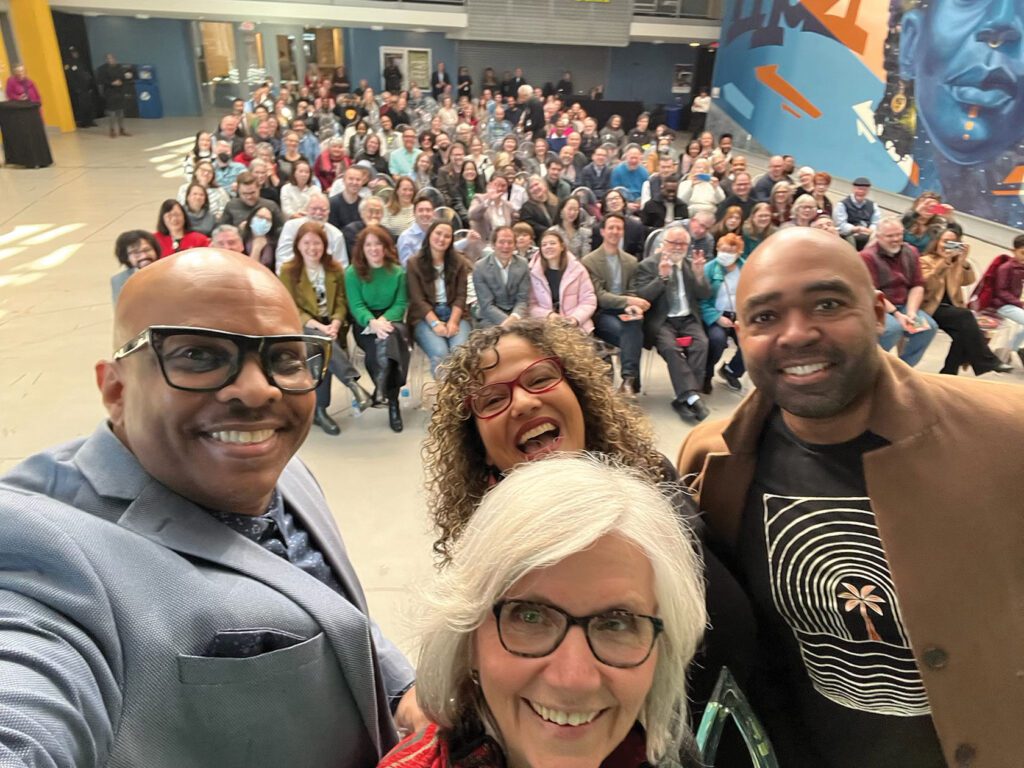Secret Society of Black Creatives honored at MassArt
Group aims to build a ‘village’ to support diverse film industry

The Secret Society of Black Creatives, a group dedicated to supporting people of color in the film industry, was honored Dec. 16 for their efforts, including creating a critical diversity pipeline to talent.
Vladimir Minuty, the group’s founder and president, said he was humbled and grateful for the recognition, which he said came as a surprise.
“I didn’t start SSBC thinking about getting honored or getting an award,” he said. “We just started it as an idea and just were working toward figuring out ways to solve some issues and to give back to the community.”
The group, along with five others, were recognized at the inaugural Common Good Awards ceremony by the Massachusetts College of Arts and Design, which is celebrating its 150th year. The awards recognize groups at the integration of the arts, advocacy and civic life.
Mary Grant, president of MassArt, said the awards highlight the fact that skills from disciplines in the arts — such as perception, empathy and teamwork — can be used for change.
“All those skills that come with being a creative, with being an artist, with being a designer… translate beautifully into how to make a difference in our communities,” Grant said.
Five other sets of awardees were honored at the ceremony, including the rock band Wilco, musician and pediatrician Dr. Lisa Wong, retired Boston art teacher Jozeph Zaremba and the real estate developers who worked to permanently preserve the Western Avenue arts community in Lowell.
The Secret Society of Black Creatives’ efforts were led by Minuty, Evelyn Brito, Malik Williams, and Nerissa Williams Scott, officials said.
“To be a young organization and to be recognized … by others, it’s an honor,” said Williams Scott, the society’s treasurer and education director. Williams Scott runs That Chile Got Talent Entertainment, an event and film production company.
The organization was founded officially in 2022, but the idea came earlier in 2020 after George Floyd’s murder and the racial reckoning that followed. Minuty said he found himself in many meetings about how to increase diversity in the film industry and decided to create a network that both connects people of color working in the industry and brings new people into the fold.
“Nothing like this — addressing diversity, equity and inclusion in the music, film, TV, streaming media — has existed before ever in the state,” said Malik Williams, the group’s vice president.
The group focus includes education and access. It also runs a series of networking events called The Konnect.
Williams Scott said people often don’t know of the variety of jobs in the film industry. She recalled talking with her dry cleaner about the work she’s doing when the daughter of the owner expressed an interest in the film industry but said she did not know where to start.
The girl was sitting at a sewing machine, said Williams Scott, who said she explained potential positions to pursue, including costume design.
“You already have a skill; Let’s use it for making movies,” Williams Scott said.
The society also has a pilot program called the Dojo, a mentoring program that allows participants to shadow industry professionals, and its work focuses on finding the most qualified to do jobs.
“Our mission is not for us to be the Black people on set,” he said. “We want to be viewed as the qualified people on set that happened to be Black right? And we want people to understand that there’s a lot of qualified people out there that could do this job.”
Four of the group’s leaders have extensive experience as directors or in producing, screenwriting and audio engineering.
“We can all connect, we all have the same goals and we often come together with our expertise so we can actually expand our services and our events,” said Brito, the group’s resource and events producer.
Williams said that wealth of experience also allows the group to build a community that people can trust.
“Right now, there is no village,” Williams said. “People talk about that — ‘Oh, it takes a village’ — and I say it all the time too. It does take a village, but we don’t have a village. So how do we build that village?”
Grant, the MassArt president, said the group’s work is powerful and inspiring.
“To [bring] together a group of professionals who are already in the industry [and] to be able to help create those networking opportunities is a visual representation of saying, ‘This is my path. This is how you can do it,’” Grant said. “It’s often so hard to imagine doing something if you don’t see yourself represented by those who are doing it.”






